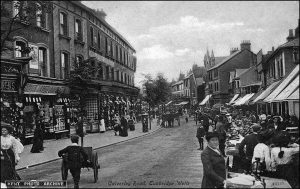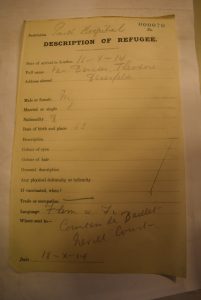The task I had was to compile a database of all those Belgian refugees who signed the Club Albert album presented to the Misses Scott in July 1916. The aim is to provide a snapshot for statistical purposes of Belgian refugees living in Tunbridge Wells who attended the Club at 32 Calverley Road (where Waterstones and Hotter are now). They would go there to obtain advice, support, to make contact with their community group, enjoy friendship and gain material help. The photo below shows the street as it would have looked 100 years ago.

Alison Sandford Mackenzie rigorously transcribed the contents of the album, and that transcription was my starting point. In addition, Alison, Anne Logan, and Kate Bradley had previously travelled to Brussels and managed to photograph some 717 registration forms, letters and scraps of paper, which related to those refugees who spent time in Tunbridge Wells (and some who didn’t).
Refugees were required to register their presence in England from December 1914, and also when they changed address, even for a short period of time. Some frequently moved around the country, and a form was supposed to be filled out every time. We were bemused to find a family having to register before going on a two week holiday to Bournemouth.
The registration form system was a chaotic one and by no means comprehensive. Reasons to relocate were many and various, such as joining relatives, finding work elsewhere, and moving from hostel-type accommodation into a lodging house, or private home. And of course many returned to Belgium to join the military, or carry out war work. The vast majority of Belgian refugees had returned home by 1919.
The Club Albert signatories’ documentation did not always include such information as ages and previous occupation, so I had to scour the forms for those missing details. There were sometimes vague cross references to family members, relationships and connections.
More practical difficulties I encountered with the registration forms were that a great many were undated, the handwriting was very faint, there were lots of crossings out, and refugees spoke no English, only French and/or Flemish, so their answers had to be translated or interpreted by the registrars themselves. The photo below is one of the initial refugee centre registration forms and it illustrated some of the difficulties of working with photos of such old, faint, and fragile documents.

Along the way I found it easier to create a card index of names of all the Club Albert signatories, writing out the information gained alongside numbered references of the registration form photos. If anyone is researching a particular family staying in Tunbridge Wells or outlying area, they are very welcome to contact me and find out if I have any extra information noted down on my cards. I can also point them towards the relevant photographed registration forms for a closer look
Comparing the forms and the Club album, I came across all sorts of intriguing information, such as a young woman married at age 15, and references to a young female noted as a ‘companion’ of a male refugee.
The database is now complete as far as it goes, but although all refugees were supposed to be registered, there are around twenty signatories of the Club Albert album, for whom we did not find a registration form, and so information about them is incomplete. The search continues.
The registration forms are often confusing and muddled. I suppose that reflects the trauma and awful life changes experienced by those Belgian refugees fleeing to and staying in England during the First World War. Compiling this information has brought home to me the reality of life as a refugee, having to account for your whereabouts and very existence. How traumatic it must have been to be separated from your loved ones, lose contact with family, friends and the life you had known, and to make decisions about the future, amidst such an atmosphere of fear and uncertainty.
